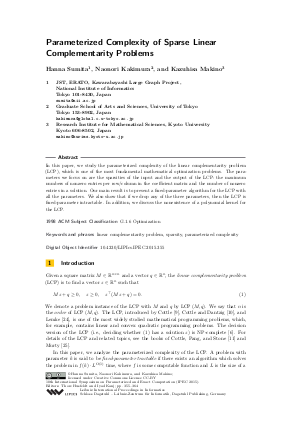Parameterized Complexity of Sparse Linear Complementarity Problems
Authors Hanna Sumita, Naonori Kakimura, Kazuhisa Makino
-
Part of:
Volume:
10th International Symposium on Parameterized and Exact Computation (IPEC 2015)
Part of: Series: Leibniz International Proceedings in Informatics (LIPIcs)
Part of: Conference: International Symposium on Parameterized and Exact Computation (IPEC) - License:
 Creative Commons Attribution 3.0 Unported license
Creative Commons Attribution 3.0 Unported license
- Publication Date: 2015-11-19
File

PDF
LIPIcs.IPEC.2015.355.pdf
- Filesize: 465 kB
- 10 pages
Document Identifiers
Subject Classification
Keywords
- linear complementarity problem
- sparsity
- parameterized complexity
Metrics
- Access Statistics
-
Total Accesses (updated on a weekly basis)
0PDF Downloads0Metadata Views
Abstract
In this paper, we study the parameterized complexity of the linear complementarity problem (LCP), which is one of the most fundamental mathematical optimization problems. The parameters we focus on are the sparsities of the input and the output of the LCP: the maximum numbers of nonzero entries per row/column in the coefficient matrix and the number of nonzero entries in a solution. Our main result is to present a fixed-parameter algorithm for the LCP with all the parameters. We also show that if we drop any of the three parameters, then the LCP is fixed-parameter intractable. In addition, we discuss the nonexistence of a polynomial kernel for the LCP.
Cite As Get BibTex
Hanna Sumita, Naonori Kakimura, and Kazuhisa Makino. Parameterized Complexity of Sparse Linear Complementarity Problems. In 10th International Symposium on Parameterized and Exact Computation (IPEC 2015). Leibniz International Proceedings in Informatics (LIPIcs), Volume 43, pp. 355-364, Schloss Dagstuhl – Leibniz-Zentrum für Informatik (2015)
https://doi.org/10.4230/LIPIcs.IPEC.2015.355
BibTex
@InProceedings{sumita_et_al:LIPIcs.IPEC.2015.355,
author = {Sumita, Hanna and Kakimura, Naonori and Makino, Kazuhisa},
title = {{Parameterized Complexity of Sparse Linear Complementarity Problems}},
booktitle = {10th International Symposium on Parameterized and Exact Computation (IPEC 2015)},
pages = {355--364},
series = {Leibniz International Proceedings in Informatics (LIPIcs)},
ISBN = {978-3-939897-92-7},
ISSN = {1868-8969},
year = {2015},
volume = {43},
editor = {Husfeldt, Thore and Kanj, Iyad},
publisher = {Schloss Dagstuhl -- Leibniz-Zentrum f{\"u}r Informatik},
address = {Dagstuhl, Germany},
URL = {https://drops.dagstuhl.de/entities/document/10.4230/LIPIcs.IPEC.2015.355},
URN = {urn:nbn:de:0030-drops-55962},
doi = {10.4230/LIPIcs.IPEC.2015.355},
annote = {Keywords: linear complementarity problem, sparsity, parameterized complexity}
}
Author Details
References
-
V. Arvind, J. Köbler, S. Kuhnert, and J.Torán. Solving linear equations parameterized by Hamming weight. In Proceedings of the 9th International Symposium on Parameterized and Exact Computation, pages 39-50, 2014.

-
H. Björklund, O. Svensson, and S. Vorobyov. Linear complementarity algorithms for mean payoff games. Technical Report 2005-05, DIMACS: Center for Discrete Mathematics and Theoretical Computer Science, 2005.

-
H. L. Bodlaender, R. G. Downey, M. R. Fellows, and D. Hermelin. On problems without polynomial kernels. Journal of Computer and System Sciences, 75:423-434, 2009.

-
X. Chen, X. Deng, and S. Teng. Sparse games are hard. In Proceedings of the 2nd International Workshop on Internet and Network Economics, pages 262-273, 2006.

-
X. Chen, X. Deng, and S. Teng. Settling the complexity of computing two-player Nash equilibria. Journal of the ACM, 56:14:1-14:57, 2009.

-
S. J. Chung. NP-completeness of the linear complementarity problem. Journal of Optimization Theory and Applications, 60:393-399, 1989.

-
B. Codenotti, M. Leoncini, and G. Resta. Efficient computation of Nash equilibria for very sparse win-lose bimatrix games. In Proceedings of the 14th Annual European Symposium on Algorithms, pages 232-243, 2006.

-
E. Cohen and N. Megiddo. Improved algorithms for linear inequalities with two variables per inequality. SIAM Journal on Computing, 23:1313-1347, 1994.

-
R. W. Cottle. The principal pivoting method of quadratic programming. In Mathematics of Decision Sciences, Part 1, pages 142-162. American Mathematical Society, Providence R. I., 1968.

-
R. W. Cottle and G. B. Dantzig. Complementary pivot theory of mathematical programming. Linear Algebra and Its Applications, 1:103-125, 1968.

-
R. W. Cottle, J. S. Pang, and R. E. Stone. The Linear Complementarity Problem. Academic Press, Boston, 1992.

-
P. Damaschke. Sparse solutions of sparse linear systems: fixed-parameter tractability and an application of complex group testing. Theoretical Computer Science, 511:137-146, 2013.

-
C. Daskalakis and C. H. Papadimitriou. On oblivious PTAS’s for Nash equilibrium. In Proceedings of the 41st Annual ACM Symposium on Theory of Computing, pages 75-84, 2009.

-
R. G. Downey and M. R. Fellows. Fixed-parameter intractability. In Proceedings of the 7th Annual Structure in Complexity Theory Conference, pages 36-49, 1992.

-
R. G. Downey and M. R. Fellows. Parameterized Complexity. Springer, New York, 1999.

-
V. Estivill-Castro and M. Parsa. Computing Nash equilibria gets harder: new results show hardness even for parameterized complexity. In Proceedings of the 15th Australasian Symposium on Computing, pages 83-90, 2009.

-
J. Flum and M. Grohe. Parameterized Complexity Theory. Springer, Berlin, 2006.

-
I. Gilboa and E. Zemel. Nash and correlated equilibria: some complexity considerations. Games and Economic Behavior, 1:80-93, 1989.

-
D. Hermelin, C. Huang, S. Kratsch, and M. Wahlström. Parameterized two-player Nash equilibrium. Algorithmica, 65:1-15, 2013.

-
D. S. Hochbaum and J. Naor. Simple and fast algorithms for linear and integer programs with two variables per inequality. SIAM Journal on Computing, 23:1179-1192, 1994.

-
S. Kratsch. On polynomial kernels for integer linear programs: covering, packing and feasibility. In Proceedings of the 21st Annual European Symposium, pages 647-658, 2013.

-
S. Kratsch. On polynomial kernels for sparse integer linear programs. In Proceedings of the 30th Symposium on Theoretical Aspects of Computer Science, pages 80-91, 2013.

-
S. Kratsch and V. A. Quyen. On kernels for covering and packing ILPs with small coefficients. In Proceedings of the 9th International Symposium on Parameterized and Exact Computation, pages 307-318, 2014.

-
C. E. Lemke. Bimatrix equilibrium points and mathematical programming. Management Science, 11:681-689, 1965.

-
K. G. Murty. Linear Complementarity, Linear and Nonlinear Programming. Internet Edition, 1997.

-
T. J. Schaefer. The complexity of satisfiability problems. In Proceedings of the 10th Annual ACM Symposium on Theory of Computing, pages 216-226, 1978.

-
H. Sumita, N. Kakimura, and K. Makino. The linear complementarity problems with a few variables per constraint. Mathematics of Operations Research, to appear.

